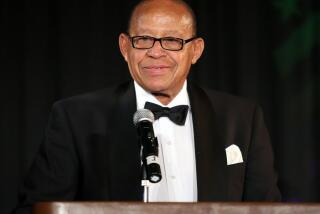Vernon Jarrett, 82; Trail-Blazing Black Print, TV, Radio Journalist in Chicago
- Share via
Vernon Jarrett, a pioneering black journalist who used his syndicated newspaper columns and long-running radio and television shows to educate Americans about the nation’s legacy of slavery and segregation, has died. He was 82.
Jarrett died Sunday of cancer at the University of Chicago Hospitals.
Education was part of Jarrett’s family’s tradition. He liked to recall for readers and viewers how his parents, the children of slaves, overcame poverty and discrimination to become schoolteachers in rural Tennessee.
A native of Saulsbury, Tenn., Jarrett came to Chicago in 1946 during the heyday of the Great Migration, a mass movement of African Americans hoping to escape Jim Crow.
“I was one of the thousands of dreamers who had left the South and journeyed to the big cities of the North,” he once wrote.
For Jarrett, who earned his bachelor’s degree at Knoxville College, the dream came true.
He won dozens of journalism and humanitarian awards and nurtured a political movement that culminated in the 1983 election of Harold Washington, Chicago’s first black mayor.
“Vernon came out of Tennessee determined to go the distance and to go the distance his way,” said Lerone Bennett Jr., executive editor of Ebony magazine and author of “Before the Mayflower: A History of Black America.”
“He had a strong sense of history and felt intellectuals ought to be involved in politics,” Bennett said. “He thought people, of all races, needed to be involved in a struggle to take control of their own lives.”
Jarrett began his career at the Chicago Defender in the 1940s, started contributing to the Chicago Tribune in 1970 and became the Tribune’s first African American syndicated columnist. In 1983 he moved to the Chicago Sun-Times and remained there until 1994.
He broke into broadcasting in 1948 with Negro Newsfront, radio’s first daily newscast produced by African Americans. For many years, he hosted a Sunday morning television talk show in Chicago.
He was a senior fellow at the University of Illinois at Chicago, and taught history and journalism at other local colleges.
In 1977 he founded the Afro-Academic Cultural, Technological and Scientific Olympics, an intellectual competition for high school students. Under the sponsorship of the National Assn. for the Advancement of Colored People, ACT-SO has awarded tens of thousands of dollars in college scholarships.
“My father lived for that ACT-SO program,” said his son Thomas. “Of all his accomplishments, he was proudest of that.”
He was an inspiration for a younger generation of black journalists who followed him into mainstream newsrooms, recalled Tribune columnist Clarence Page. He noted that Jarrett’s columns could be scathing but that he dished out criticism on an equal opportunity basis.
“To white readers he could seem like a firebrand, but Vernon was equally tough on blacks,” Page said. “After an election with a low voter turnout, he’d remind them of the struggles Southern blacks had gone through to get a vote.”
Jarrett was a founding member of the National Assn. of Black Journalists and president of the Chicago chapter at the time of his death.
In addition to his son, Jarrett is survived by his wife, Fernetta.
Services are pending.
More to Read
Sign up for Essential California
The most important California stories and recommendations in your inbox every morning.
You may occasionally receive promotional content from the Los Angeles Times.













